Apps
Auto Added by WPeMatico
Auto Added by WPeMatico
As founding CEO of MoviePass, Stacy Spikes has already changed the way we think about paying for movie tickets. Now he’s pursuing a new approach — providing a free ticket to people who watch 15 to 20 minutes of ads.
Spikes noted that when it comes to watching movies outside the theater, there are three basic business models — pay-per-view, subscription and ad-supported. MoviePass brought a subscription approach into theaters, but Spikes (who stepped down as MoviePass CEO in 2016) told me he kept wondering, “Well, why can’t you have an ad-supported version that will allow you to go to movies for free?”
It’s hard to imagine digital advertising being worth enough to really pay for that ticket, but Spikes insisted, “You’re paying your way. This is not going to be a loss-leader model. It’s an ad-revenue based business.”
To make that work, he said the new service, called PreShow, is bringing a of couple innovations to the table. First, there’s facial recognition technology that ensures you’re actually present and watching the ad.
Spikes demonstrated this feature for me last week, showing me how his face unlocked the PreShow app. Once he’d chosen the film he wanted to watch, he was presented with a package of video ads that were specifically selected to run with that movie — and any time he looked away from the screen or moved too far away from his phone, the ads would stop playing. (Apparently the sensitivity can be dialed up or down depending on user feedback.)

Spikes also said the ads should tie into the film in some way, whether that’s thematically, or by highlighting products that are also featured in the movie. And they’ll always include an opportunity to further engage with the advertiser.
So although 15 to 20 minutes might sound like a long time to watch ads, it should be more interesting for the viewer than just a random collection of promotional videos. And for the advertisers that are already paying for product placement in a film, this could be a way to reinforce their message with consumers who are actually watching the movie. (Spikes also compared this to the marketing packages that usually play before showtime in theaters — hence the company name.)
By watching one of these 15 to 20-minute packages, you should earn enough points to purchase a ticket at the theater using a virtual credit card provided by PreShow. Technically, those points can be used to buy any movie ticket, but Spikes said you won’t be able to earn more than two tickets at once, “so people don’t stockpile.”
As for whether PreShow is competing with his old company, Spikes said, “I don’t think they’re competitive in any way. If you compare a subscription platform to an ad platform to a pay-per-view platform, they’re different animals.”

Stacy Spikes
The plan is to start testing the service with a select group of users in the next three to six months, and to find those users, PreShow is launching a Kickstarter campaign today. Pledge levels range from $15 to $60, with the amount you pay determining how early you get access, and how many friend invites you receive.
Spikes said he’s less interested in raising money (which is why the campaign’s official goal is only $10,000) and more in attracting film lovers who want to try the app.
“It’s a way to have innovation happen more organically, versus if you just open it up for the general public,” Spikes said.
Powered by WPeMatico
Want to star in your favorite memes and movie scenes? Upload a selfie to Morphin, choose your favorite GIF and your face is grafted in to create a personalized copy you can share anywhere. Become Tony Stark as he suits up like Iron Man. Drop the mic like Obama, dance like Drake or slap your mug on Fortnite characters.
Now after three years in stealth developing image-mapping technology, Morphin is ready to launch its put-you-in-a-GIF maker. While it might look like just a toy, investors see real business potential. Morphin raised $1 million last summer from Betaworks, the incubator that spawned Giphy, plus Founders Fund, Precursor, Shrug Capital and Boost.vc’s accelerator.

Elon Musk as Iron Man
“We believe in the future you’ll be able to be the main character in your own film. Imagine a super hero movie where you’re the main protagonist?,” co-founder Loic Ledoux asks. “That sounded like science fiction a few years ago and now with AI and computer vision we definitely see our tech going there.”
Ledoux also wants to reclaim faceswaps as something fun rather than a weapon for misinformation. “Deepfakes brought something pretty negative to computer vision. But it’s not all bad. It’s about how you use the tech to give people a new tool for self expressions and storytelling.” And since Morphin re-generates the whole clip from scratch with CGI animation, they look right at a glance, but clearly aren’t manipulated copies of the original video designed to fool anyone.

Kanye performs magic
Morphin started three years ago with the intention to build personalized avatars for games and VR so you could be a FIFA soccer player or Skyrim knight. Ledoux had started a 3D printing company to explore opportunities in scanning and modeling when he saw a chance to connect your real and virtual faces. He teamed up with his co-founder Nicholas Heriveaux, who’d spent 13 years working on 3D tech while modding games like Grand Theft Auto to insert his avatar and assets.
What they quickly recognized was that “People were just reacting to themselves on the screen,” ignoring the gameplay, Ledoux recalls. “Being able to see yourself as a hero was the underlying sentiment, so we focused on video completely.” Recognizable GIFs became its preferred medium, as they combine familiarity and the ability to convey complex emotions with a template that’s easy to personalize so they stand out.

Morphin’s tech no longer requires 3D scanning hardware and it works with just a regular selfie. You just snap a headshot, select a GIF from its iOS or Android app’s library and a few seconds later you have a CGI version of yourself in the scene (with no watermark) that you can export and post. “We wanted it to be super straightforward because we wanted people to relate to the content,” Ledoux notes. Over 1 million scenes have been created by 50,000 beta users, and each time a celebrity shares one of the GIFs Morphin has been sending them for marketing, scores of their followers demand to know which app they were using.
Morphin’s nine-person French team will have to keep innovating to stay ahead of avatar-making competitors like the ubiquitous Snapchat Bitmoji, Genies, Moji Edit and Mirror AI. Facebook, Microsoft and Google all have launched or are building their own avatar creators. But these typically live as 2D stickers or 3D AR animations you overlay on the real world. By using GIFs as a canvas, Morphin takes the pressure off your visage looking perfect and instead emphasizes the message you’re trying to get across.
The challenge will be for Morphin to become a consistent part of people’s communication stack. It’s easy to imagine playing with it and posting a few GIFs. But iconic new GIFs don’t emerge each day and without a social network to stay for, Morphin is at risk of becoming merely a forgotten tool. The app might need TikTok-style challenges like submitting the best personalized GIF to match a prompt or a GIF browsing feed to keep people coming back.

Turning Donald Glover into Jay Gatsby
Morphin isn’t racing to monetize yet, but sees a chance to sell longer premium video scenes à la carte or as an unlimited subscription. Ledoux eventually hopes to unlock new forms of storytelling beyond existing GIFs. There’s also a chance for Morphin to highlight sponsored clips from upcoming movies or TV shows. “In the long-term we’re more interested in the analogy of Lil Miquela and how people are interacting with digital characters,” Ledoux explains, citing a virtual pop star whose developer Brud recently raised at a $125 million valuation.
One of the most exciting things about Morphin is that it will allow people to take the spotlight no matter how they look. Often times certain races, genders and looks are unfairly excluded from starring in today’s most popular media. But Morphin could let the underrepresented take their rightful place as stars of the screen.

Your faithful author Josh Constine dropping the mic like Obama
Powered by WPeMatico
Google is widely expected to be handed a third antitrust fine in Europe this week, with reports suggesting the European Commission’s decision in its long-running investigation of AdSense could land later today.
Right on cue the search giant has PRed another Android product tweak — which it bills as “supporting choice and competition in Europe”.
In the coming months Google says it will start prompting users of existing and new Android devices in Europe to ask which browser and search apps they would like to use.
This follows licensing changes for Android in Europe which Google announced last fall, following the Commission’s $5BN antitrust fine for anti-competitive behavior related to how it operates the dominant smartphone OS.
tl;dr competition regulation can shift policy and product.
Albeit, the devil will be in the detail of Google’s self-imposed ‘remedy’ for Android browser and search apps.
Which means how exactly the user is prompted will be key — given tech giants are well-versed in the manipulative arts of dark pattern design, enabling them to create ‘consent’ flows that deliver their desired outcome.
A ‘choice’ designed in such a way — based on wording, button/text size and color, timing of prompt and so on — to promote Google’s preferred browser and search app choice by subtly encouraging Android users to stick with its default apps may not actually end up being much of a ‘choice’.
According to Reuters the prompt will surface to Android users via the Play Store. (Though the version of Google’s blog post we read did not include that detail.)
Using the Play Store for the prompt would require an Android device to have Google’s app store pre-loaded — and licensing tweaks made to the OS in Europe last year were supposedly intended to enable OEMs to choose to unbundle Google apps from Android forks. Ergo making only the Play Store the route for enabling choice would be rather contradictory. (As well as spotlighting Google’s continued grip on Android.)
Add to that Google has the advantage of massive brand dominance here, thanks to its kingpin position in search, browsers and smartphone platforms.
So again the consumer decision is weighted in its favor. Or, to put it another way: ‘This is Google; it can afford to offer a ‘choice’.’
In its blog post getting out ahead of the Commission’s looming AdSense ruling, Google’s SVP of global affairs, Kent Walker, writes that the company has been “listening carefully to the feedback we’re getting” vis-a-vis competition.
Though the search giant is actually appealing both antitrust decisions. (The other being a $2.7BN fine it got slapped with two years ago for promoting its own shopping comparison service and demoting rivals’.)
“After the Commission’s July 2018 decision, we changed the licensing model for the Google apps we build for use on Android phones, creating new, separate licenses for Google Play, the Google Chrome browser, and for Google Search,” Walker continues. “In doing so, we maintained the freedom for phone makers to install any alternative app alongside a Google app.”
Other opinions are available on those changes too.
Such as French pro-privacy Google search rival Qwant, which last year told us how those licensing changes still make it essentially impossible for smartphone makers to profit off of devices that don’t bake in Google apps by default. (More recently Qwant’s founder condensed the situation to “it’s a joke“.)
Qwant and another European startup Jolla, which leads development of an Android alternative smartphone platform called Sailfish — and is also a competition complainant against Google in Europe — want regulators to step in and do more.
The Commission has said it is closely monitoring changes made by Google to determine whether or not the company has complied with its orders to stop anti-competitive behavior.
So the jury is still out on whether any of its tweaks sum to compliance. (Google says so but that’s as you’d expect — and certainly doesn’t mean the Commission will agree.)
In its Android decision last summer the Commission judged that Google’s practices harmed competition and “further innovation” in the wider mobile space, i.e. beyond Internet search — because it prevented other mobile browsers from competing effectively with its pre-installed Chrome browser.
So browser choice is a key component here. And ‘effective competition’ is the bar Google’s homebrew ‘remedies’ will have to meet.
Still, the company will be hoping its latest Android tweaks steer off further Commission antitrust action. Or at least generate more fuzz and fuel for its long-game legal appeal.
Current EU competition commissioner, Margrethe Vestager, has flagged for years that the division is also fielding complaints about other Google products, including travel search, image search and maps. Which suggests Google could face fresh antitrust investigations in future, even as the last of the first batch is about to wrap up.
The FT reports that Android users in the European economic area last week started seeing links to rival websites appearing above Google’s answer box for searches for products, jobs or businesses — with the rival links appearing above paid results links to Google’s own services.
The newspaper points out that tweak is similar to a change promoted by Google in 2013, when it was trying to resolve EU antitrust concerns under the prior commissioner, Joaquín Almunia.
However rivals at the time complained the tweak was insufficient. The Commission subsequently agreed — and under Vestager’s tenure went on to hit Google with antitrust fines.
Walker doesn’t mention these any of additional antitrust complaints swirling around Google’s business in Europe, choosing to focus on highlighting changes it’s made in response to the two extant Commission antitrust rulings.
“After the Commission’s July 2018 decision, we changed the licensing model for the Google apps we build for use on Android phones, creating new, separate licenses for Google Play, the Google Chrome browser, and for Google Search. In doing so, we maintained the freedom for phone makers to install any alternative app alongside a Google app,” he writes.
Nor does he make mention of a recent change Google quietly made to the lists of default search engine choices in its Chrome browser — which expanded the “choice” he claims the company offers by surfacing more rivals. (The biggest beneficiary of that tweak is privacy search rival DuckDuckGo, which suddenly got added to the Chrome search engine lists in around 60 markets. Qwant also got added as a default choice in France.)
Talking about Android specifically Walker instead takes a subtle indirect swipe at iOS maker Apple — which now finds itself the target of competition complaints in Europe, via music streaming rival Spotify, and is potentially facing a Commission probe of its own (albeit, iOS’ marketshare in Europe is tiny vs Android). So top deflecting Google.
“On Android phones, you’ve always been able to install any search engine or browser you want, irrespective of what came pre-installed on the phone when you bought it. In fact, a typical Android phone user will usually install around 50 additional apps on their phone,” Walker writes, drawing attention to the fact that Apple does not offer iOS users as much of a literal choice as Google does.
“Now we’ll also do more to ensure that Android phone owners know about the wide choice of browsers and search engines available to download to their phones,” he adds, saying: “This will involve asking users of existing and new Android devices in Europe which browser and search apps they would like to use.”
We’ve reached out to Commission for comment, and to Google with questions about the design of its incoming browser and search app prompts for Android users in Europe and will update this report with any response.
Powered by WPeMatico
Opera had a couple of tumultuous years behind it, but it looks like the Norwegian browser maker (now in the hands of a Chinese consortium) is finding its stride again and refocusing its efforts on its flagship mobile and desktop browsers. Before the sale, Opera offered a useful stand-alone and built-in VPN service. Somehow, the built-in VPN stopped working after the acquisition. My understanding is that this had something to do with the company being split into multiple parts, with the VPN service ending up on the wrong side of that divide. Today, it’s officially bringing this service back as part of its Android app.
The promise of the new Opera VPN in Opera for Android 51 is that it will give you more control over your privacy and improve your online security, especially on unsecured public WiFi networks. Opera says it uses 256-bit encryption and doesn’t keep a log or retain any activity data.

Since Opera now has Chinese owners, though, not everybody is going to feel comfortable using this service, though. When I asked the Opera team about this earlier this year at MWC in Barcelona, the company stressed that it is still based in Norway and operates under that country’s privacy laws. The message being that it may be owned by a Chinese consortium but that it’s still very much a Norwegian company.
If you do feel comfortable using the VPN, though, then getting started is pretty easy (I’ve been testing in the beta version of Opera for Android for a while). Simply head to the setting menu, flip the switch, and you are good to go.
“Young people are being very concerned about their online privacy as they increasingly live their lives online, said Wallman. “We want to make VPN adoption easy and user-friendly, especially for those who want to feel more secure on the Web but are not aware on how to do it. This is a free solution for them that works.”
What’s important to note here is that the point of the VPN is to protect your privacy, not to give you a way to route around geo-restrictions (though you can do that, too). That means you can’t choose a specific country as an endpoint, only ‘America,’ ‘Asia,’ and ‘Europe.’
Powered by WPeMatico
Electric-vehicle chargers, heads-up displays for soldiers and the Costco of weed were some of our favorites from prestigious startup accelerator Y Combinator’s Winter 2019 Demo Day 1. If you want to take the pulse of Silicon Valley, YC is the place to be. But with more than 200 startups presenting across two stages and two days, it’s tough to keep track.
You can check out our write-ups of all 85 startups that launched on Demo Day 1, and come back later for our full index and picks from Day 2. But now, based on feedback from top investors and TechCrunch’s team, here’s our selection of the top 10 companies from the first half of this Y Combinator batch, and why we picked each.
Looking around corners is one of the most dangerous parts of war for infantry. Ravn builds heads-up displays that let soldiers and law enforcement see around corners thanks to cameras on their gun, drones or elsewhere. The ability to see the enemy while still being behind cover saves lives, and Ravn already has $490,000 in Navy and Air Force contracts. With a CEO who was a Navy Seal who went on to study computer science, plus experts in augmented reality and selling hardware to the Department of Defense, Ravn could deliver the inevitable future of soldier heads-up displays.
Why we picked Ravn: The AR battlefield is inevitable, but right now Microsoft’s HoloLens team is focused on providing mid-fight information, like how many bullets a soldier has in their clip and where their squad mates are. Ravn’s tech was built by a guy who watched the tragic consequences of getting into those shootouts. He wants to help soldiers avoid or win these battles before they get dangerous, and his team includes an expert in selling hardened tech to the U.S. government.

It’s difficult to know if a business’ partners have paid their taxes, filed for bankruptcy or are involved in lawsuits. That leads businesses to write off $120 billion a year in uncollectable bad debt. Middesk does due diligence to sort out good businesses from the bad to provide assurance for B2B deals, loans, investments, acquisitions and more. By giving clients the confidence that they’ll be paid, Middesk could insert itself into a wide array of transactions.
Why we picked Middesk: It’s building the trust layer for the business world that could weave its way into practically every deal. More data means making fewer stupid decisions, and Middesk could put an end to putting faith in questionable partners.

Convictional helps direct-to-consumer companies approach larger retailers more simply. It takes a lot of time for a supplier to build a relationship with a retailer and start selling their products. Convictional wants to speed things up by building a B2B self-service commerce platform that allows retailers to easily approach brands and make orders.
Why we picked Convictional: There’s been an explosion of D2C businesses selling everything from suitcases to shaving kits. But to drive exposure and scale, they need retail partners who’re eager not to be cut out of this growing commerce segment. Playing middleman could put Convictional in a lucrative position, while also making it a nexus of valuable shopping data.

Dyneti has invented a credit card scanner SDK that uses a smartphone’s camera to help prevent fraud by more than 50 percent and improve conversion for businesses by 5 percent. The business was started by a pair of former Uber employees, including CEO Julia Zheng, who launched the fraud analytics teams for Account Security and UberEATS. Dyneti’s service is powered by deep learning and works on any card format. In the two months since it launched, the company has signed contracts with Rappi, Gametime and others.
Why we picked Dyneti: Cybersecurity threats are growing and evolving, yet underequipped businesses are eager to do more business online. Dyneti is one of those fundamental B2B businesses that feels like Stripe — capable of bringing simplicity and trust to a complex problem so companies can focus on their product.

The “Airbnb for electric-vehicle chargers,” ampUp is preparing for a world in which the majority of us drive EVs — it operates a mobile app that connects a network of thousands of EV chargers and drivers. Using the app, an electric-vehicle owner can quickly identify an available and compatible charger, and EV charger owners can earn cash sharing their charger at their own price and their own schedule. The service is currently live in the Bay Area.
Why we picked ampUp: Electric vehicles are inevitable, but reliable charging is one of the leading fears dissuading people from buying. Rather than build out some massive owned network of chargers that will never match the distributed gas station network, ampUp could put an EV charger anywhere there’s someone looking to make a few bucks.
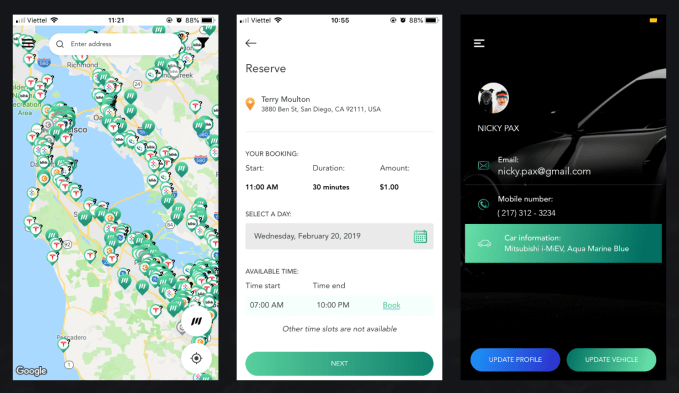
Flockjay operates an online sales academy that teaches job seekers from underrepresented backgrounds the skills and training they need to pursue a career in tech sales. The 12-week bootcamp offers trainees coaching and mentorship. The company has launched its debut cohort with 17 students, 100 percent of whom are already in job interviews and 40 percent of whom have already secured new careers in the tech industry.
Why we picked Flockjay: Unlike coding bootcamps that can require intense prerequisites, killer salespeople can be molded from anyone with hustle. Those from underrepresented backgrounds already know how to expertly sell themselves to attain opportunities others take for granted. Flockjay could provide economic mobility at a crucial juncture when job security is shaky.

Twenty million international contractors work with U.S. companies, but it’s difficult to onboard and train them. Deel handles the contracts, payments and taxes in one interface to eliminate paperwork and wasted time. Deel charges businesses $10 per contractor per month and a 1 percent fee on payouts, which earns it an average of $560 per contractor per year.
Why we picked Deel: The destigmatization of remote work is opening new recruiting opportunities abroad for U.S. businesses. But unless teams can properly integrate these distant staffers, the cost savings of hiring overseas are negated. As the globalization megatrend continues, businesses will need better HR tools.

There has been a pretty major trend toward services that make it easier to build web pages or mobile apps. Glide lets customers easily create well-designed mobile apps from Google Sheets pages. This not only makes it easy to build the pages, but simplifies the skills needed to keep information updated on the site.
Why we picked Glide: While desktop website makers is a brutally competitive market, it’s still not easy to make a mobile site if you’re not a coder. Rather than starting from a visual layout tool with which many people would still be unfamiliar, Glide starts with a spreadsheet that almost everyone has used. And as the web begins to feel less personal with all the brands and influencers, Glide could help people make bespoke apps that put intimacy and personality first.
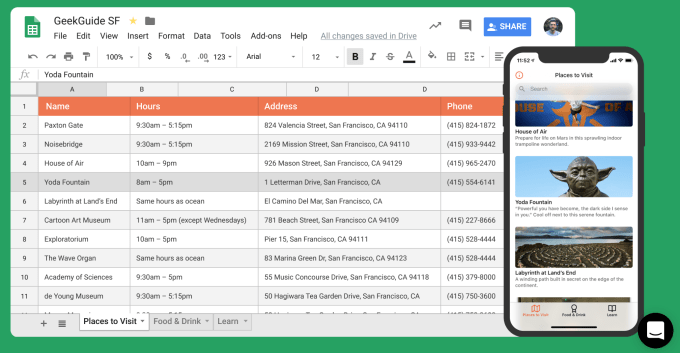
The platform, co-founded by former Uber product manager Minh Tri Pham, turns documents into structured data a computer can understand to accurately automate document processing workflows and take away the need for human data entry. Docucharm’s API can understand various forms of documents (like paystubs, for example) and will extract the necessary information without error. Its customers include tax prep company Tributi and lending business Aspire.
Why we picked Docucharm: Paying high-priced, high-skilled workers to do data entry is a huge waste. And optical character recognition like Docucharm’s will unlock new types of businesses based on data extraction. This startup could be the AI layer underneath it all.
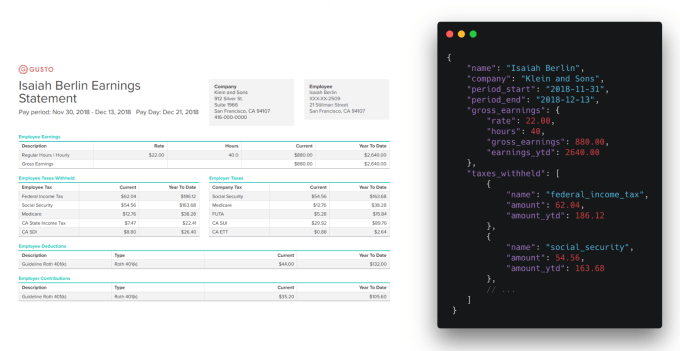
Flower Co provides memberships for cheaper weed sales and delivery. Most dispensaries cater to high-end customers and newbies that want expensive products and tons of hand-holding. In contrast, Flower Co caters to long-time marijuana enthusiasts who want huge quantities at low prices. They’re currently selling $200.000 in marijuana per month to 700 members. They charge $100 a year for membership, and take 10 percent on product sales.
Why we picked Flower Co: Marijuana is the next gold rush, a once-in-a-generation land-grab opportunity. Yet most marijuana merchants have focused on hyper-discerning high-end customers despite the long-standing popularity of smoking big blunts of cheap weed with a bunch of friends. For those who want to make cannabis consumption a lifestyle, and there will be plenty, Flower Co could become their wholesaler.

Atomic Alchemy – Filling the shortage of nuclear medicine
Yourchoice – Omni-gender non-hormonal birth control
Prometheus – Turning CO2 into gas
Lumos – Medical search engine for doctors
Heart Aerospace – Regional electric planes
Boundary Layer Technologies – Super-fast container ships
Additional reporting by Kate Clark, Greg Kumparak and Lucas Matney
Powered by WPeMatico
To prevent its own Cambridge Analytica moment and make sure it’s getting paid for its data, Twitter will audit developers using its APIs. Starting June 19th, Twitter will require developers of any app that calls recent tweets from or mentions a user more than 100,000 times per day to submit their app for review.
If a developer proves they have a legitimate consumer use case, like running a third-party Twitter client or doing research, they’ll be granted free access to the API at the same rate they have today. If they primarily use the data to serve business customers as a B2B tool, like for customer service or social media monitoring, they’ll have to pay to enter a commercial licensing agreement with Twitter with a custom price based on usage. Twitter refused to even specify the range those prices fall into, which won’t win it any extra trust.
Developers found to be breaking Twitter’s policies will be booted from the platform, while those that don’t submit for review will be capped at 100,000 requests per day for the user timeline and mentions APIs. Twitter says it suspended 162,000 apps in the second half of 2018, showing it’s willing to play hardball with developers that endanger its ecosystem.
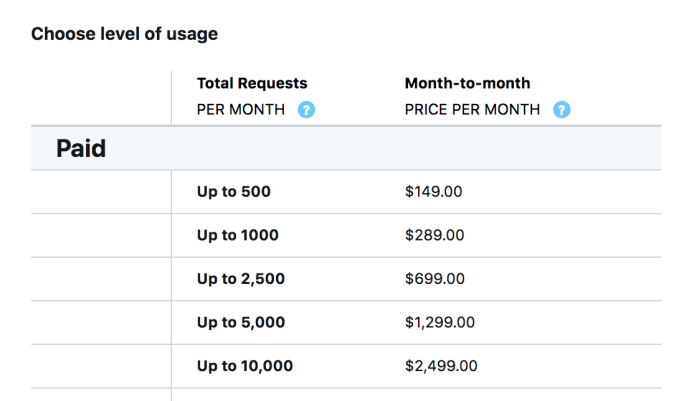
The goal is “ensuring that our platform is safe and promoting the privacy and safety of our users, and providing a level playing field commercially,” Twitter’s head of site integrity Yoel Roth tells me. “We’re fundamentally different than other platforms that have APIs since almost everything that happens on our service is public. That doesn’t mean we don’t have a deep responsibility to our users.”
This is the second big platform safety move Twitter has made after last year requiring all new developers who sign up to have their use cases reviewed, and get white-listed if they publish more content to Twitter than a normal person could. But that still left all the old developers without proper oversight, which will change in June.
In the past, Twitter has thrashed developers with whiplash by suddenly changing its API policies. That led apps to break, businesses to fold and a perception of Twitter as an unreliable or even hostile place for developers to build. This time, Twitter is giving developers a three-month heads-up to minimize surprise and problems. At a time when developers are becoming increasingly suspicious of Facebook, treating them better so they keep building bonus experiences is a smart move for Twitter.
Powered by WPeMatico
MoviePass is bringing back a version of the plan that made it so popular in the first place — a subscription where you pay a monthly fee and get an unlimited number of 2D movie tickets.
MoviePass Uncapped will have a regular price of $19.95 per month, but the company is offering cheaper deals for what it says is a limited time. If you’re willing to pay for a full year (via ACH payment), it will cost the same as that original unlimited plan, namely $9.95 per month. If you don’t want to make a full-year commitment, it will cost $14.95 per month.
Now, you may be thinking that this kind of deal is exactly what got MoviePass into so much trouble last year, to the point where it nearly ran out of money and began announcing new pricing plans and restrictions on a seemingly constant basis.
However, the company’s announcement today includes multiple references to its ability to “combat violations” of MoviePass’ terms of use. And those terms do say that “MoviePass has the right to limit the selection of movies and/or the times of available movies should your individual use adversely impact MoviePass’s system-wide capacity or the availability of the Service for other subscribers.”
So if you’re a heavy MoviePass user, the plan may not be truly unlimited.
In addition, you’ll only be able to reserve tickets three hours before showtime, and you’ll need to check in to the theater between 10 and 30 minutes before the movie starts.
This new plan replaces the ones announced in December. If you’ve already signed up, you can stick to those subscriptions, but new users won’t have that option.
In a statement, Ted Farnsworth, CEO of MoviePass parent company Helios and Matheson Analytics, said:
We are – and have been – listening to our subscribers every day, and we understand that an uncapped subscription plan at the $9.95 price point is the most appealing option to our subscribers. While we’ve had to modify our service a number of times in order to continue delivering a movie-going experience to our subscribers, with this new offering we are doing everything we can to bring people a version of the service that originally won their hearts.
Powered by WPeMatico
Cookie-cutter corporate housing turns people into worker drones. When an employee needs to move to a new city for a few months, they’re either stuck in bland, giant apartment complexes or Airbnbs meant for shorter stays. But Zeus lets any homeowner get paid to host white-collar transient labor. Through its managed ownership model, Zeus takes on all the furnishing, upkeep, and risk of filling the home while its landlords sit back earning cash.
Zeus has quietly risen to a $45 million revenue run rate from renting out 900 homes in 23 cities. That’s up 5X in a year thanks to Zeus’ 150 employees. With a 90 percent occupancy rate, it’s proven employers and their talent want more unique, trustworthy, well-equipped multi-month residences that actually make them feel at home.
Now while Airbnb is distracted with its upcoming IPO, Zeus has raised $24 million to steal the corporate housing market. That includes a previous $2.5 million seed round from Bowery, the new $11.5 million Series A led by Initialized Capital whose partner Garry Tan has joined Zeus’ board, and $10 million in debt to pay fixed costs like furniture. The plan is to roll up more homes, build better landlord portal software, and hammer out partnerships or in-house divisions for cleaning and furnishing.

“In the first decade out of school people used to have two jobs. Now it’s four jobs and it’s trending to five” says Zeus co-founder and CEO Kulveer Taggar. “We think in 10 years, these people won’t be buying furniture.” He imagines they’ll pay a premium for hand-holding in housing, which judging by the explosion in popularity of zero-friction on-demand services, seems like an accurate assessment of our lazy future. Meanwhile, Zeus aims to be “the quantum leap improvement in the experience of trying to rent out your home” where you just punch in your address plus some details and you’re cashing checks 10 days later.
“When I sold my first startup, I bought a home for my mom in Vancouver” Taggar recalls. It was payback for when she let him remortgage her old house while he was in college to buy a condo in Mumbai he’d rent out to earn money. “Despite not having much growing up, my mom was a travel agent and we got to travel a lot” which Taggar says inspired his goal to live nomadically in homes around the world. Zeus could let other live that dream.

Zeus co-founder and CEO Kulveer Taggar
After Oxford and working as an analyst at Deutsche Bank, Taggar built student marketplace Boso before moving to the United States. There, he co-founded auction tool Auctomatic with his cousin Harjeet Taggar and future Stripe co-founder Patrick Collison, went through Y Combinator, and sold it to Live Current Media for $5 million just 10 months later. That gave him the runway to gift a home to his mom and start tinkering on new ideas.
With Y Combinator’s backing again, Taggar started NFC-triggered task launcher Tagstand, which pivoted into app settings configurer Agent, which pivoted into automatic location sharing app Status. But when his co-founder Joe Wong had to move an hour south from San Francisco to Palo Alto, Taggar was dumbfounded by how distracting the process was. Listing and securing a new tenant was difficult, as was finding a medium-term rental without having to deal with exhorbitant prices or sketchy Cragislist. Having seen his former co-founder go on to great success with Stripe’s dead-simple payments integration, Taggar wanted to combine that vision with OpenDoor’s easy home sales to making renting or renting out a place instantaneous. That spawned Zeus.
To become a Zeus landlord, you just type in your address, how many bedrooms and bathrooms, and some aesthetic specs, and you get a monthly price quote for what you’ll be paid. Zeus comes in and does a 250-point quality assessment, collects floor plans, furnishes the property, and handles cleaning and maintenance. It works with partners like Helix mattresses, Parachute sheets, and Simple Human trash cans to get bulk rates. “We raised debt because we had these fixed investments into furniture. It’s not as dilutive as selling pure equity” Taggar explains.
Zeus quickly finds a tenant thanks to listings in Airbnb and relationships with employers like Darktrace and ZS Associates with lots of employees moving around. After passing background checks, tenants get digital lock codes and access to 24/7 support in case something doesn’t look right. The goal is to get someone sleeping there in just 10 days. “Traditional corporate housing is $10,000 a month in SF in the summer or at extended stay hotels. Airbnb isn’t well suited [for multi-month stays]. ” Taggar claims. “We’re about half the price of traditional corporate housing for a better product and a better experience.”

Zeus signs minimum two-year leases with landlords and tries to extend them to five years when possible. It gets one free month of rent as is standard for property managers, but doesn’t charge an additional rate. For example, Zeus might lease your home for $4,000 per month but gets the first month free, and rent it out for $5,000 so it earns $60,000 but pays you $44,000. That’s a tidy margin if Zeus can get homes filled fast and hold down its upkeep costs.
“Zeus has been instrumental for my company to start the process of re-location to the Bay Area and to host our visiting employees from abroad now that we are settled” writes Zeus client Meitre’s Luis Caviglia. “I particularly like the ‘hard truths’ featured in every property, and the support we have received when issues arose during our stays.”
There’s no shortage of competitors chasing this $18 billion market in the US alone. There are the old-school corporations and chains like Oakwood and Barbary Coast that typically rent out apartments from vast, generic complexes at steep rates. Stays over 30 days made up 15 percent of Airbnb’s business last year, but the platform wasn’t designed for peace-of-mind around long-term stays. There are pure marketplaces like UrbanDoor that don’t always take care of everything for the landlord or provide consistent tenant experiences. And then there are direct competitors like $130 million-funded Sonder, $66 million-funded Domio, recently GV-backed 2nd Address, and European entants like MagicStay, AtHomeHotel, and Homelike.

Zeus’ property unit growth
There’s plenty of pie, though. With 330,000 housing units in SF alone, Zeus has plenty of room to grow. The rise of remote work means companies whose employee typically didn’t relocate may now need to bring in distant workers for a multi-month sprint. A recession could make companies more expense-cautious, leading them to rethink putting up staffers in hotels for months on end. Regulatory red tape and taxes could scare landlords away from short-term rentals and towards coprorate housing. And the need to expand into new businesses could tempt the big vacation rental platforms like Airbnb to make acquisitions in the space — or try to crush Zeus.
Winners will be determined in part by who has the widest and cheapest selection of properties, but also by which makes people most comfortable in a new city. That’s why Taggar is taking a cue from WeWork by trying to arrange more community events for its tenants. Often in need of friends, Zeus could become a favorite by helping people feel part of a neighborhood rather than a faceless inmate in a massive apartment block or hotel. That gives Zeus network effect if it can develop density in top markets.
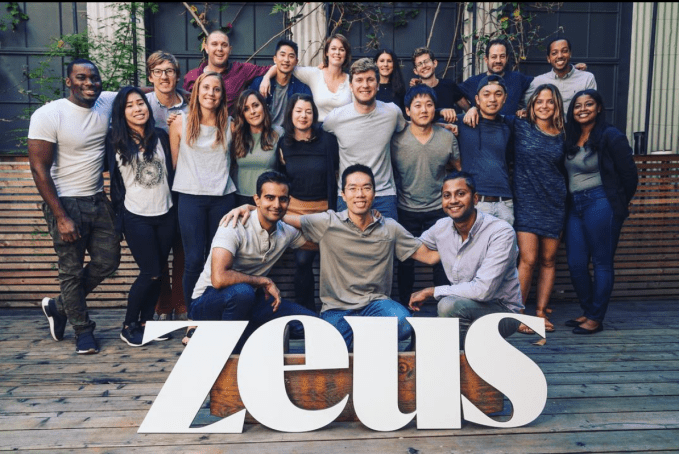
Taggar says the biggest challenge is that “I feels like I’m running five startups at once. Pricing, supply chain, customer service, B2B. We’ve decided to make everything custom — our own property manager software, our own internal CRM. We think these advantages compound, but I could be wrong and they could be wasted effort.”
The benefits of Zeus‘ success would go beyond the founder’s bank account. “I’ve had friends in New York get great opportuntiies in San Francisco but not take them because of the friction of moving” Taggar says. Routing talent where it belongs could get more things built. And easy housing might make people more apt to live abroad temporarily. Taggar concludes, “I think it’s a great way to build empathy.”
Powered by WPeMatico
A former judge and family law educator has teamed up with tech entrepreneurs to launch an app they hope will help divorced parents better manage their co-parenting disputes, communications, shared calendar and other decisions within a single platform. The app, called coParenter, aims to be more comprehensive than its competitors, while also leveraging a combination of AI technology and on-demand human interaction to help co-parents navigate high-conflict situations.
The idea for coParenter emerged from co-founder Hon. Sherrill A. Ellsworth’s personal experience and entrepreneur Jonathan Verk, who had been through a divorce himself.
Ellsworth had been a presiding judge of the Superior Court in Riverside County, California for 20 years and a family law educator for 10. During this time, she saw firsthand how families were destroyed by today’s legal system.
“I witnessed countless families torn apart as they slogged through the family law system. I saw how families would battle over the simplest of disagreements like where their child will go to school, what doctor they should see and what their diet should be — all matters that belong at home, not in a courtroom,” she says.

Ellsworth also notes that 80 percent of the disagreements presented in the courtroom didn’t even require legal intervention — but most of the cases she presided over involved parents asking the judge to make the co-parenting decision.
As she came to the end of her career, she began to realize the legal system just wasn’t built for these sorts of situations.
She then met Jonathan Verk, previously EVP Strategic Partnerships at Shazam and now coParenter CEO. Verk had just divorced and had an idea about how technology could help make the co-parenting process easier. He already had on board his longtime friend and serial entrepreneur Eric Weiss, now COO, to help build the system. But he needed someone with legal expertise.
That’s how coParenter was born.
The app, also built by CTO Niels Hansen, today exists alongside a whole host of other tools built for different aspects of the co-parenting process.
That includes those apps designed to document communication, like OurFamilyWizard, Talking Parents, AppClose and Divvito Messenger; those for sharing calendars, like Custody Connection, Custody X Exchange and Alimentor; and even those that offer a combination of features like WeParent, 2houses, SmartCoparent and Fayr, among others.

But the team at coParenter argues that their app covers all aspects of co-parenting, including communication, documentation, calendar and schedule sharing, location-based tools for pickup and drop-off logging, expense tracking and reimbursements, schedule change requests, tools for making decisions on day-to-day parenting choices like haircuts, diet, allowance, use of media, etc. and more.
Notably, coParenter also offers a “solo mode” — meaning you can use the app even if the other co-parent refuses to do the same. This is a key feature that many rival apps lack.
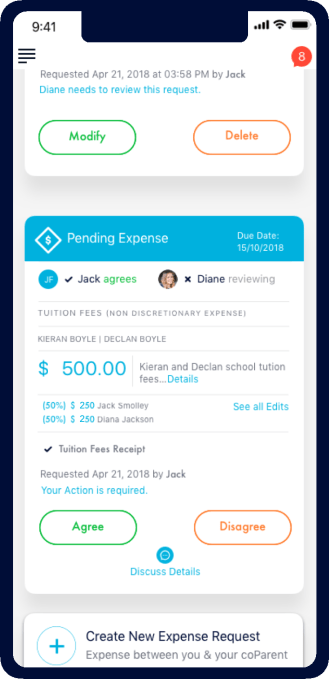
However, the biggest differentiator is how coParenter puts a mediator of sorts in your pocket.
The app begins by using AI, machine learning and sentiment analysis technology to keep conversations civil. The tech will jump in to flag curse words, inflammatory phrases and offensive names to keep a heated conversation from escalating — much like a human mediator would do when trying to calm two warring parties.
When conversations take a bad turn, the app will pop up a warning message that asks the parent if they’re sure they want to use that term, allowing them time to pause and think. (If only social media platforms had built features like this!)

When parents need more assistance, they can opt to use the app instead of turning to lawyers.
The company offers on-demand access to professionals as both monthly ($12.99/mo – 20 credits, or enough for two mediations) or yearly ($119.99/year – 240 credits) subscriptions. Both parents can subscribe for $199.99/year, each receiving 240 credits.
“Comparatively, an average hour with a lawyer costs between $250 and upwards of $500, just to file a single motion,” Ellsworth says.
These professionals are not mediators, but are licensed in their respective fields — typically family law attorneys, therapists, social workers or other retired bench officers with strong conflict resolution backgrounds. Ellsworth oversees the professionals to ensure they have the proper guidance.

All communication between the parent and the professional is considered confidential and not subject to admission as evidence, as the goal is to stay out of the courts. However, all the history and documentation elsewhere in the app can be used in court, if the parents do end up there.
The app has been in beta for nearly a year, and officially launched this January. To date, coParenter claims it has already helped to resolve more than 4,000 disputes and more than 2,000 co-parents have used it for scheduling. Indeed, 81 percent of the disputing parents resolved all their issues in the app, without needing a professional mediator or legal professional, the company says.
CoParenter is available on both iOS and Android.
Powered by WPeMatico